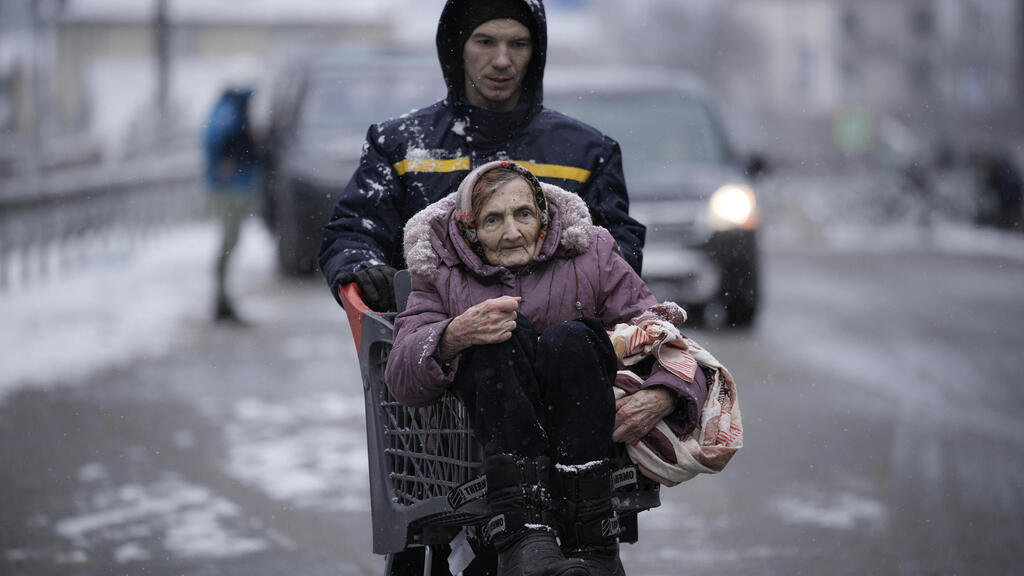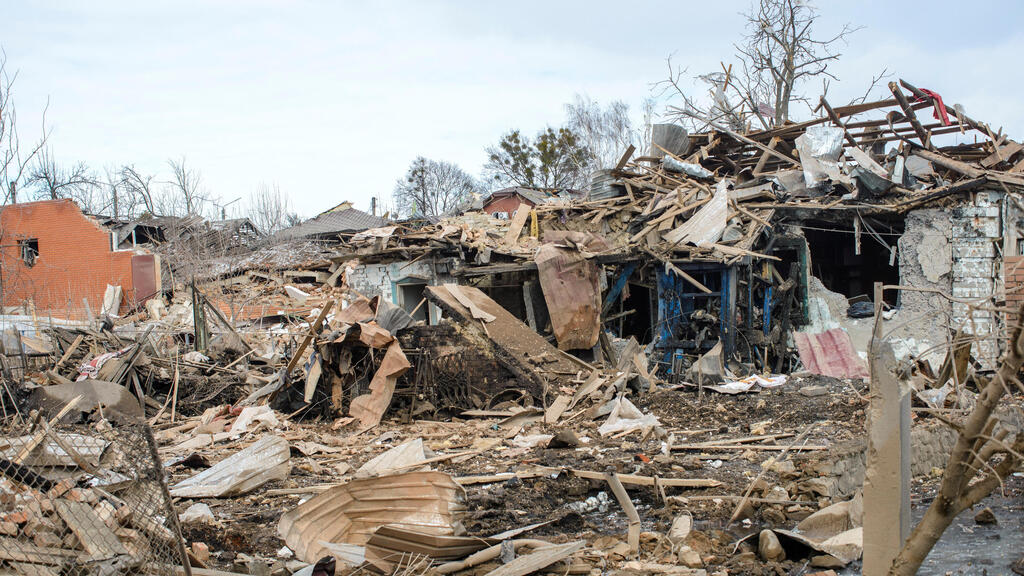Getting your Trinity Audio player ready...
Russia said it is ready to provide humanitarian corridors on Wednesday for people fleeing Kyiv and four other Ukrainian cities, as the number of refugees created by the biggest assault on a European country since World War Two surpassed 2 million.
Mikhail Mizintsev, head of Russia's National Defense Control Centre, was quoted as saying by the Tass news agency that Russian forces would "observe a regime of silence" from 10 a.m. Moscow time (0700 GMT) to ensure safe passage for civilians wishing to leave Kyiv, Chernihiv, Sumy, Kharkiv and Mariupol.
5 View gallery
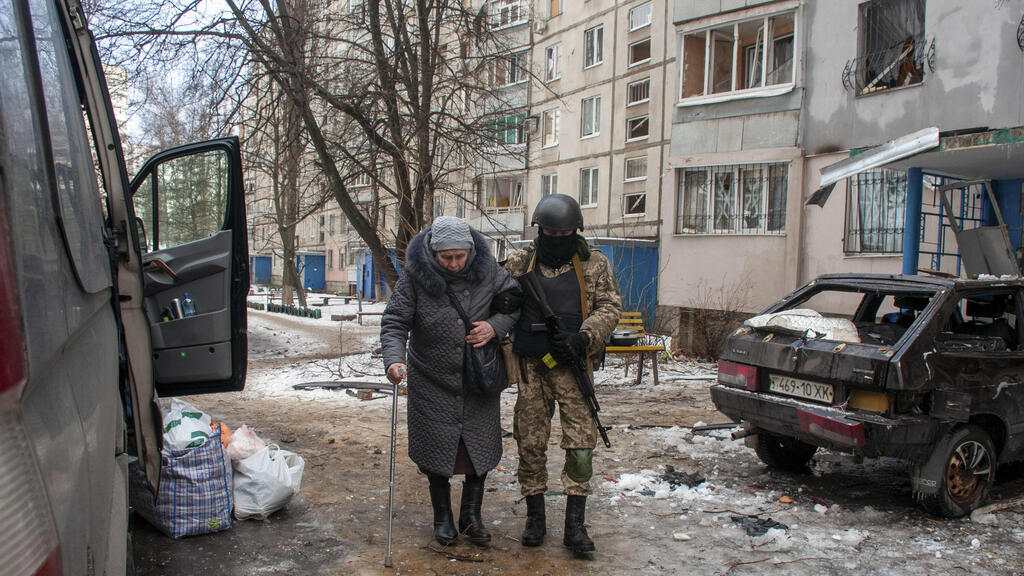

A Ukrainian soldier assists an elderly woman on the streets of Kharkiv on Tuesday
(Photo: EPA)
It was unclear if the proposed routes would pass through Russia or Belarus, conditions previously opposed by the Ukrainian government.
Civilians fled the besieged city of Sumy on Tuesday in the first successful "humanitarian corridor" opened since Russia's invasion. Ukraine accused Russian forces of shelling another evacuation route, from Mariupol in the south of the country.
Ukraine President Volodymyr Zelensky released a video clip late on Tuesday claiming 52 children had been killed since Russia invaded his country last month.
Zelensky praised the U.S. and Britain for their decision to ban import of Russian oil and Gas.
"Either Russia respects international law and does not start wars or it will be without funds to do so," Zelensky said.
The United States on Tuesday, banned imports of Russian oil in a major new step in the Western-led effort to halt the war by crippling Russia's economy, sparking a further increase in the oil price.
Prices have surged more than 30% since Russia - the world's second-largest exporter of crude - invaded its neighbor on Feb. 24.
Despite the prospect of higher household bills, U.S. President Joe Biden said his Russian counterpart Vladimir Putin needed to face consequences for the assault.
"The American people will deal another powerful blow to Putin's war machine," he said.
5 View gallery
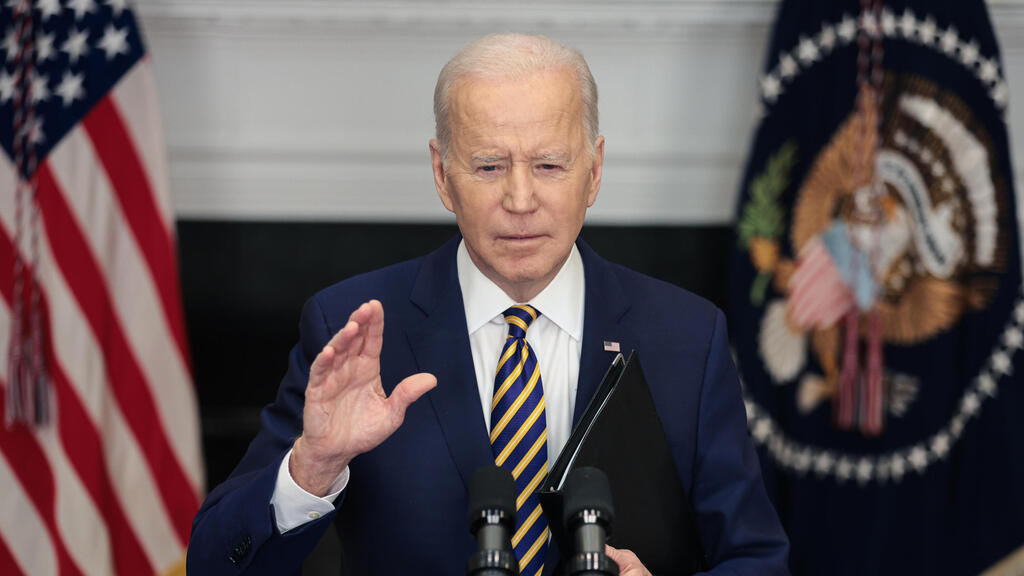

U.S. President Joe Biden announces a ban on imports of Russian oil and gas products, on Tuesday
(Photo: EPA)
Britain said it would phase out the import of Russian oil and oil products by the end of 2022, while the European Union published plans to cut its reliance on Russian gas by two thirds this year.
In response to the American and British move, Russia on Tuesday, threatened to cut oil and gas supplies to Europe.
The Kremlin describes its invasion as a "special operation" to disarm Ukraine and unseat leaders it calls neo-Nazis. Ukraine and Western allies call this a baseless pretext for a war of choice that has raised fears of wider conflict in Europe.
China's refusal to condemn the invasion or join the international sanctions is also raising concerns in Western capitals about the potential for a wider attack on liberal democratic values globally.
5 View gallery
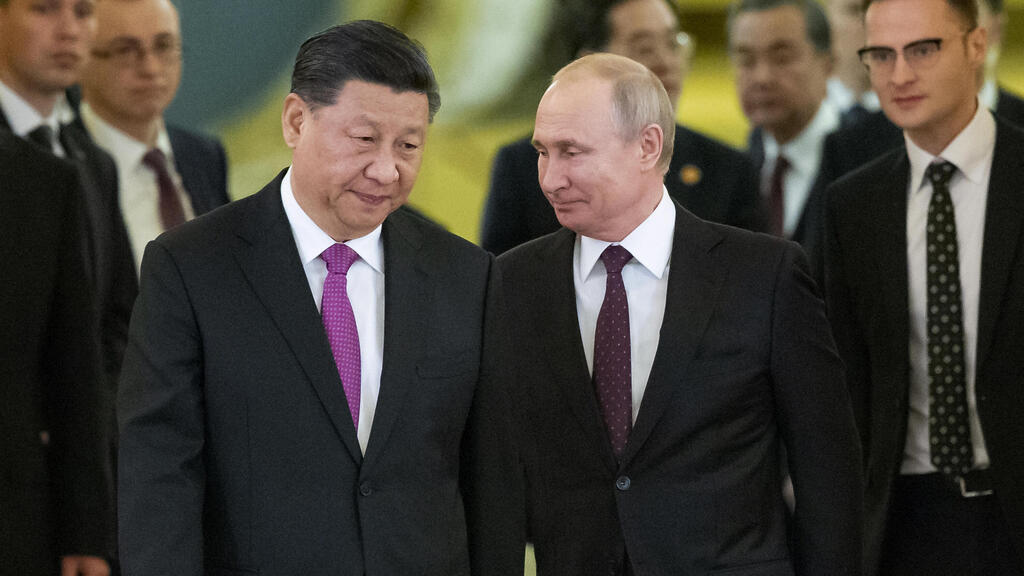

Chinese President Xi Jinping and Russian President Vladimir Putin in Beijing early last month
(Photo: AFP)
Chinese President Xi Jinping described the situation in Ukraine as worrying in a call with the leaders of France and Germany, and called for "maximum restraint," Chinese state media reported on Tuesday.
U.S. Commerce Secretary Gina Raimondo warned that Chinese companies that defied U.S. restrictions against exporting to Russia could be cut off from American equipment and software they needed to make their products.
Washington could "essentially shut" down Semiconductor Manufacturing International Corp or any Chinese companies that continued to supply chips and other advanced technology to Russia, Raimondo told the New York Times.
Australia's intelligence chief on Wednesday said there was a "troubling new strategic convergence" between Beijing and Moscow and the risk of "major-power conflict" had grown since Russia invaded Ukraine.
Russia's attack on Ukraine, a democratic country of 44 million people, has caused particular alarm in self-governed Taiwan, which China claims as its own and has vowed to reclaim, by force if necessary.
U.S. intelligence chiefs told the House of Representatives Intelligence Committee on Tuesday that China appeared to have been unsettled by the difficulties Russia was facing in Ukraine and the strength of the Western reaction.
Corporate Backlash
Adding to Russia's global isolation, McDonald's, a symbol of capitalism that opened in Russia as the Soviet Union fell, and coffeehouse chain Starbucks will temporarily close stores, while Pepsi will stop selling its soft drink brands and Coca-Cola is halting business in the country.
Yum Brands Inc, parent company of fried chicken chain KFC, said it was pausing investment in Russia, a key market that helped the brand achieve record development last year.
Western countries are walking a fine line between using harsh sanctions to stop the war as quickly as possible, while also protecting their fragile economies from rising inflation.
The conflict and ensuing sanctions have played havoc with global supply chains, sending prices soaring not only for food and energy but also key raw materials like aluminum and nickel.
Persistent high oil prices prompted by Russia's invasion could cut a full percentage point off the growth of large oil-importing developing economies like China, Indonesia, South Africa and Turkey, a World Bank official said.
The International Monetary Fund's executive board is poised to approve on Wednesday $1.4 billion in emergency funding for Ukraine to help it respond to Russia's invasion.
Polish Planes
As Western military aid poured into Ukraine over the Polish and Romanian borders, the United States turned down a surprise Polish offer to transfer MiG-29 fighter jets to a U.S. base in Germany to help replenish Ukraine's air force.
The prospect of flying combat aircraft from NATO territory into the war zone "raises serious concerns for the entire NATO alliance," the Pentagon said.
In the seaside Ukrainian town of Mariupol, people were fast running out of electricity, heat, food, and drinking water after more than a week of bombardment, the International Committee of the Red Cross said.
Russia opened a separate corridor out of the eastern city of Sumy. Buses left for Poltava further west, only hours after a Russian air strike which regional officials said had hit a residential area and killed 21 people. Reuters could not verify the incident.
Ukraine's defense ministry said Vitaly Gerasimov, first deputy commander of Russia's 41st army, was killed on Monday, the second Russian major general killed during the invasion. Russia's defense ministry could not be reached for comment.
First published: 08:29, 03.09.22


